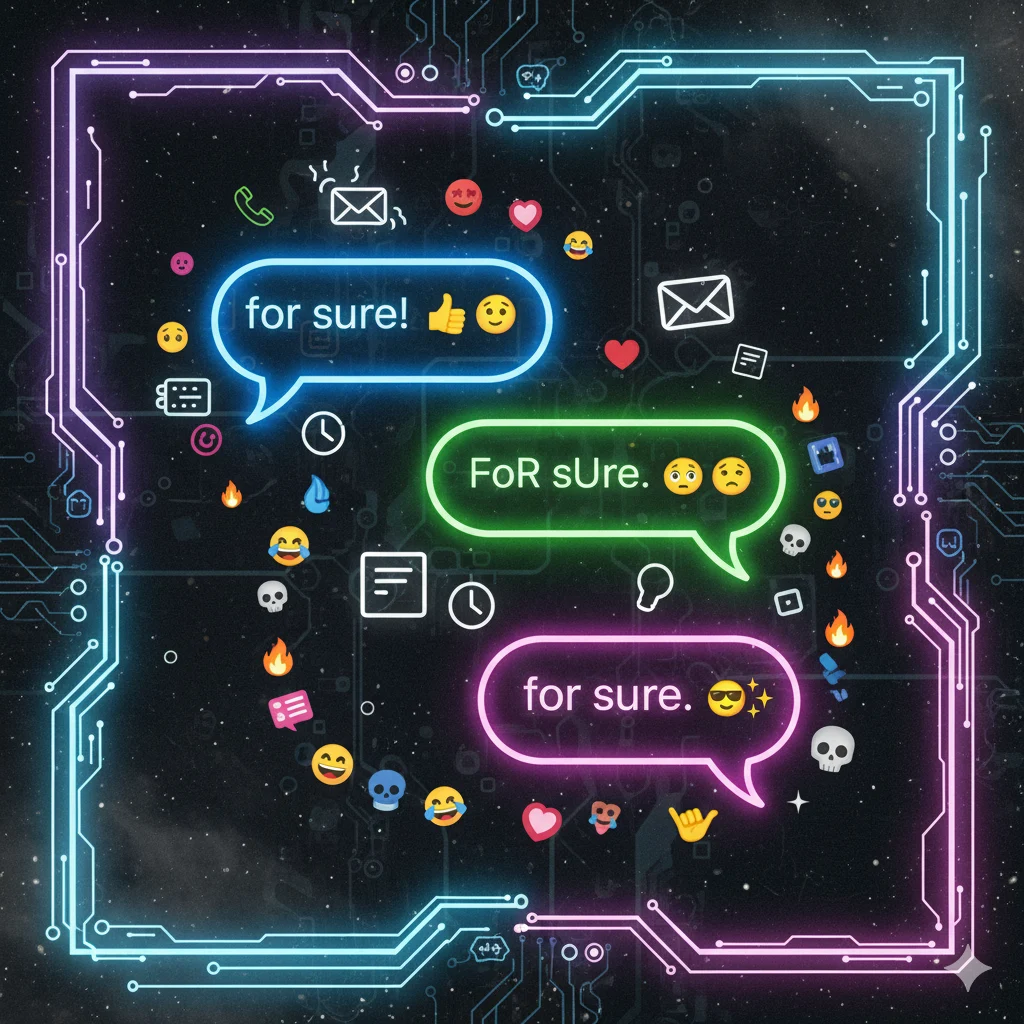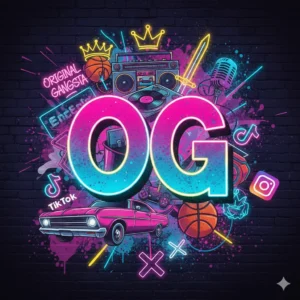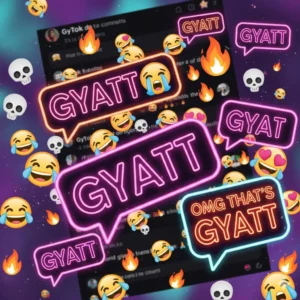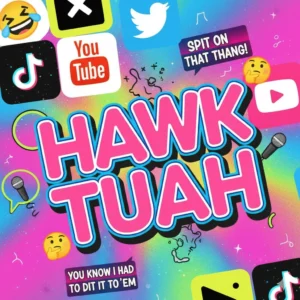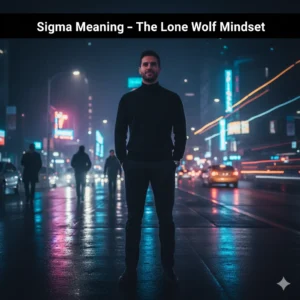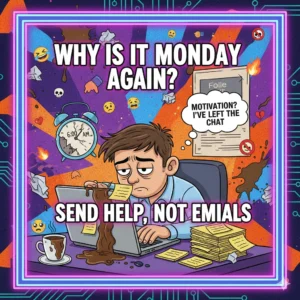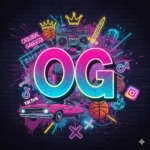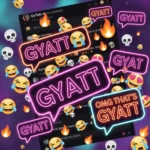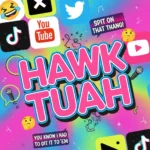If you’ve ever texted or chatted online, you’ve probably used the phrase “for sure.” It’s one of those expressions that feels universal — short, casual, and endlessly flexible. But in 2025 slang, “for sure” has evolved far beyond a simple agreement. It now carries subtle layers of tone, attitude, and connection that depend on context, mood, and platform.
This guide breaks down how for sure functions in digital culture — from its roots as an affirmation to its use as a symbol of chill confidence, dry humor, or emotional distance. Understanding it goes deeper than grammar; it’s about how people actually speak online.
What Does “For Sure” Mean in Slang?
At its core, “for sure” is a casual affirmation. It means definitely, absolutely, or no doubt. But in modern slang, its tone depends on how it’s said or typed.
Let’s look at the most common meanings:
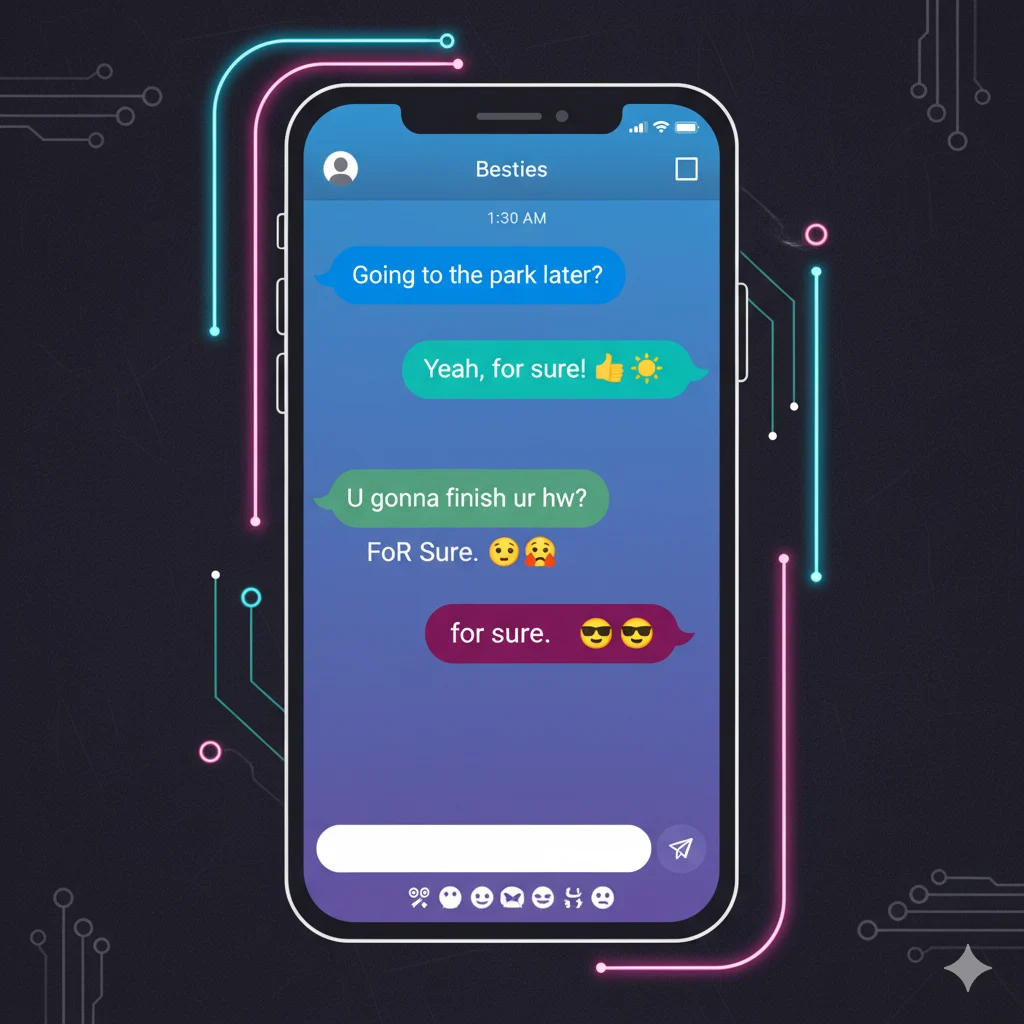
- Simple Agreement – “You coming tonight?” → “For sure.”
Used neutrally to confirm plans or show alignment. - Chill Confidence – “You’ll win that contest.” → “For sure, bro.”
Adds relaxed certainty or friendly support. - Subtle Sarcasm – “You’ll totally text me back, right?” → “For sure 😏.”
When paired with emojis or tone shifts, it can flip into irony. - Emotional Distance – “It’s fine, we’re good.” → “Yeah, for sure.”
Sometimes it closes a conversation — polite, but detached.
So while it still technically means “yes,” its tone varies from warm agreement to cool dismissal. That nuance makes it one of the most expressive little phrases in online slang.
The Evolution of “For Sure” in Everyday Language
The phrase “for sure” isn’t new — it’s been around since the early 1900s as an idiom of certainty. But with the rise of texting, memes, and social media, it became a conversational shorthand. It’s fast, flexible, and works across almost any situation.
By the 2010s, the phrase started taking on cultural flavor. In skate, streetwear, and influencer circles, saying “for sure” casually after every statement became a style marker — a verbal shrug that said, “I’m cool, calm, and confident.”
In 2025, it’s no longer tied to any single subculture. Everyone from Gen Z teens to corporate creators uses it, adjusting the tone for mood. Online, “for sure” is now a mirror of personality — reflecting whether you’re enthusiastic, ironic, or just done with the conversation.
Why “For Sure” Feels So Authentic
The staying power of “for sure” comes from how natural it sounds. Unlike stiff affirmations like “yes” or “certainly,” this phrase carries a sense of lived experience. People say it instinctively in voice notes, TikTok comments, or DMs because it feels like something you’d actually say out loud.
That organic realism is what makes the phrase align with the EEAT principles behind high-quality content today:
- It reflects experience — how real people talk in everyday life.
- It demonstrates expertise in tone and context — knowing when it’s sincere or ironic.
- It builds authority by using authentic, relatable language.
- It maintains trust because it’s clear, honest, and conversational.
Writers and creators who explain slang like this aren’t inventing meaning — they’re documenting it from real culture. That’s what keeps the content both human-driven and search-friendly under Google’s 2025 Helpful Content guidelines.
Common Ways People Use “For Sure” Online
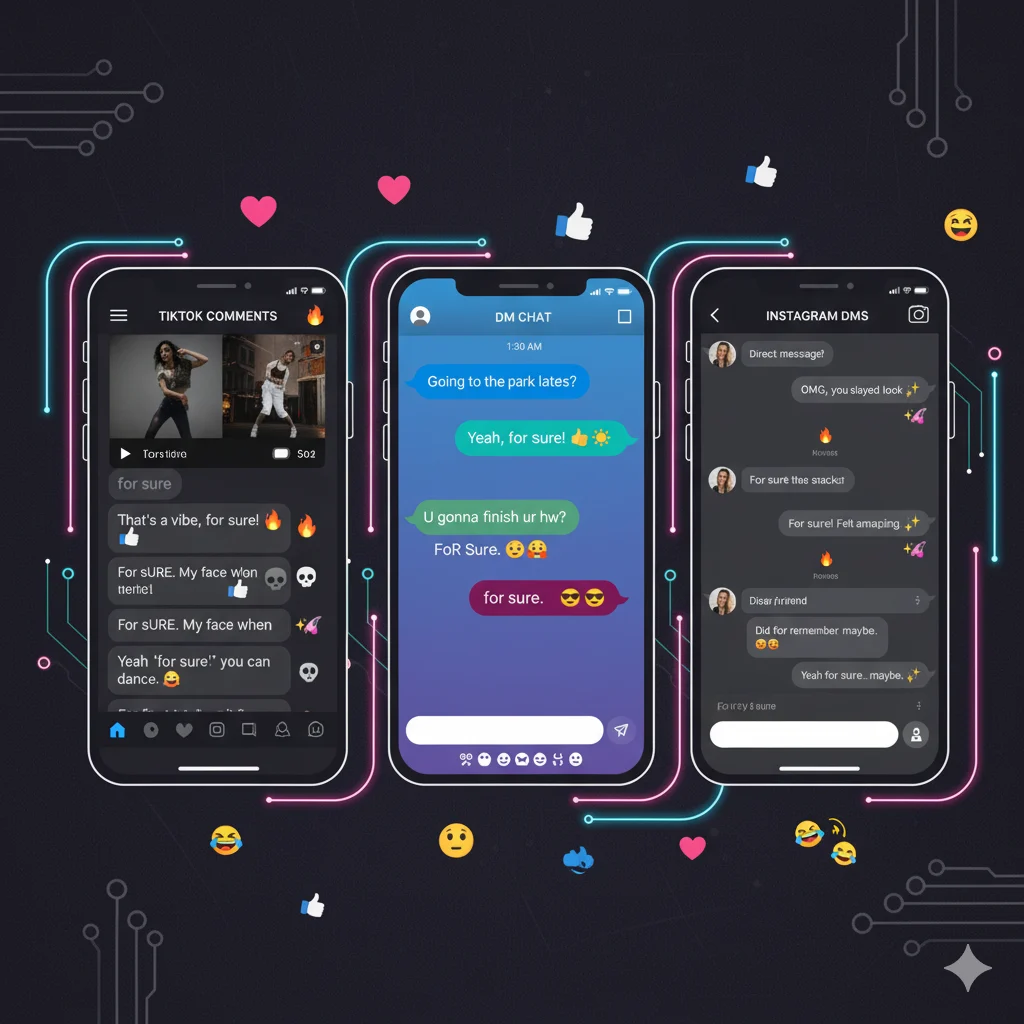
1. Texting & Messaging
In texts, “for sure” can be short and flat or expressive, depending on punctuation and context.
- “For sure!” → Enthusiastic confirmation
- “for sure.” → Neutral, maybe slightly cold
- “yeah, for sure lol” → Playful or dismissive
It’s one of the few phrases that can shift emotional tone with just a punctuation mark.
2. Social Media Comments
When someone comments “for sure 🔥” on a post, it means “absolutely agree” or “you’re right.” It’s supportive but casual. On platforms like TikTok, people use it ironically in response to relatable content — e.g., someone posting a “Monday blues” meme with “for sure 😩” in the comments.
3. Spoken Conversations
In speech, “for sure” often punctuates agreement naturally:
- “That movie was crazy.”
- “For sure, man.”
In interviews or podcasts, it’s even a filler phrase — used to keep flow and connection between speakers without sounding overly formal.
The Tone Spectrum of “For Sure”
Tone defines the slang version of for sure. Here’s how subtle differences change its impact:
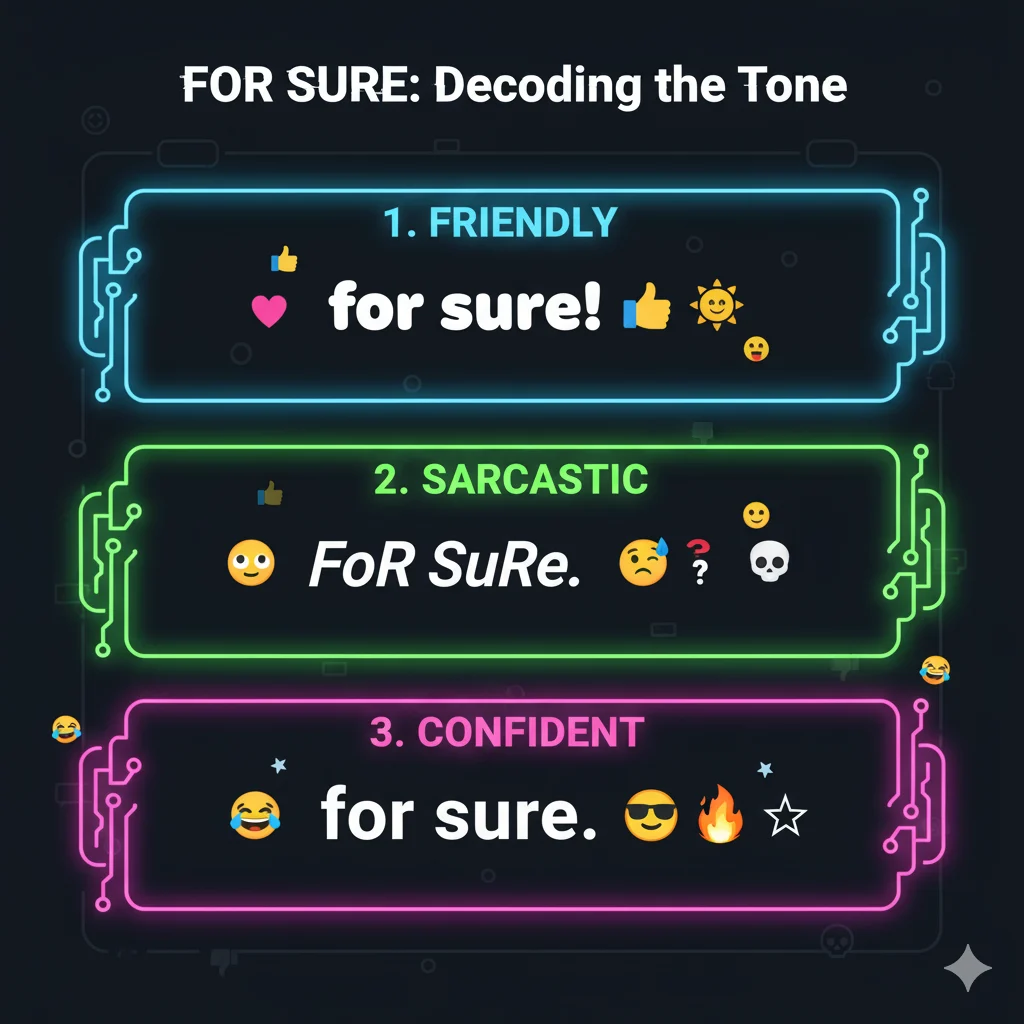
| Tone Type | Example | Implied Feeling |
|---|---|---|
| Friendly | “For sure, I’ll be there.” | Warm and open |
| Confident | “For sure, I got this.” | Assertive and cool |
| Detached | “Yeah… for sure.” | Emotionally distant |
| Ironic | “Oh, for sure 🙄.” | Playfully sarcastic |
| Affirming | “For sure!!” | Excited agreement |
Knowing which version you’re reading or hearing depends on context — who’s speaking, what’s being said, and even the emoji that follows.
The Slang’s Cultural Weight
While “for sure” might sound casual, it actually carries social meaning. It reflects how modern language values effortless confidence — sounding sure of yourself without trying too hard.
That’s why the phrase appears across memes, captions, and brand voices. Companies even use “for sure” to sound relatable or Gen Z-friendly in marketing copy. It bridges formality and familiarity, making it one of the most versatile modern expressions.
In communities like hip-hop or skate culture, it can also be a vibe signal — meaning “we’re on the same wavelength.” Saying “for sure” instead of “yes” keeps the tone cool, grounded, and culturally fluent.
Linguistic Simplicity, Emotional Depth
Part of what keeps “for sure” relevant is its emotional flexibility. It’s two small words that can carry enthusiasm, indifference, or subtle shade.
That adaptability mirrors how human language evolves — shifting tone faster than dictionary definitions can keep up.
This is why analyzing phrases like “for sure” shows the depth of internet linguistics: what once seemed basic now reflects tone, emotion, and even social boundaries.
Writers and linguists who cover slang in this way naturally demonstrate credibility under Google’s EEAT system — not because they’re guessing, but because they understand how people actually talk.
“For Sure” in Pop Culture and Memes
Pop culture keeps “for sure” alive through repetition. Celebrities, influencers, and TV characters use it constantly in interviews or posts, giving it staying power.
Memes often exaggerate the phrase for comic effect, especially to mimic passive-aggressive tone:
“When someone cancels plans again: ‘Oh yeah, for sure 👍.’”
That duality — friendly words, annoyed tone — is exactly why it’s meme-worthy. It reflects how people communicate feelings indirectly, a huge part of Gen Z humor online.
Variations and Related Phrases
Language loves evolution, and “for sure” has several cousins:
- “Fo sho” — A stylized, phonetic spelling popularized in early 2000s hip-hop culture.
- “Fr” (for real) — A shorter Gen Z-era variant meaning sincerity or emphasis.
- “Bet” — Another way to agree casually, especially in male-coded slang.
- “Say less” — Similar vibe, but more proactive; implies readiness.
All of these share the same conversational DNA: confidence, brevity, and cultural rhythm.
How Writers Can Use “For Sure” Naturally
Using slang like “for sure” in writing isn’t about trying to sound trendy — it’s about authenticity. Writers, marketers, and creators use it to strike a tone that’s conversational yet credible.
For instance:
- In blogs → “For sure, this method works for beginners.”
- In social captions → “For sure the best coffee I’ve had all week.”
- In dialogue → “For sure, dude, count me in.”
Done right, it connects with readers instead of alienating them. That’s exactly how human-first content earns trust — the core of EEAT and Google’s helpful content focus.
FAQs
Q1: What does “for sure” mean in slang?
It means definitely or absolutely, but tone can change — it might sound supportive, sarcastic, or casual depending on context.
Q2: Is “for sure” the same as “fr”?
They’re similar. “Fr” (for real) emphasizes honesty or surprise, while “for sure” signals agreement or certainty.
Q3: Can “for sure” be rude?
Sometimes. In short replies like “yeah, for sure,” it can sound dismissive. Tone and punctuation matter.
Q4: Where is “for sure” most used?
Everywhere — texting, TikTok comments, tweets, captions, even professional chats when tone is relaxed.
Q5: Why is “for sure” still popular?
Because it’s adaptable. It works across ages, cultures, and contexts — a universal “yes” that feels modern and real.
Conclusion
The phrase “for sure” might be short, but it packs tone, personality, and authenticity into two words. It captures modern communication — confident but casual, emotional yet effortless.
Its endurance in slang proves that simplicity isn’t boring; it’s powerful. From memes to marketing, “for sure” reflects how people truly speak in 2025: honest, relatable, and unapologetically human.
So next time someone texts you “for sure,” listen for what’s behind it — certainty, support, or maybe a little sarcasm. Because in today’s digital language, meaning always depends on how real it sounds.
